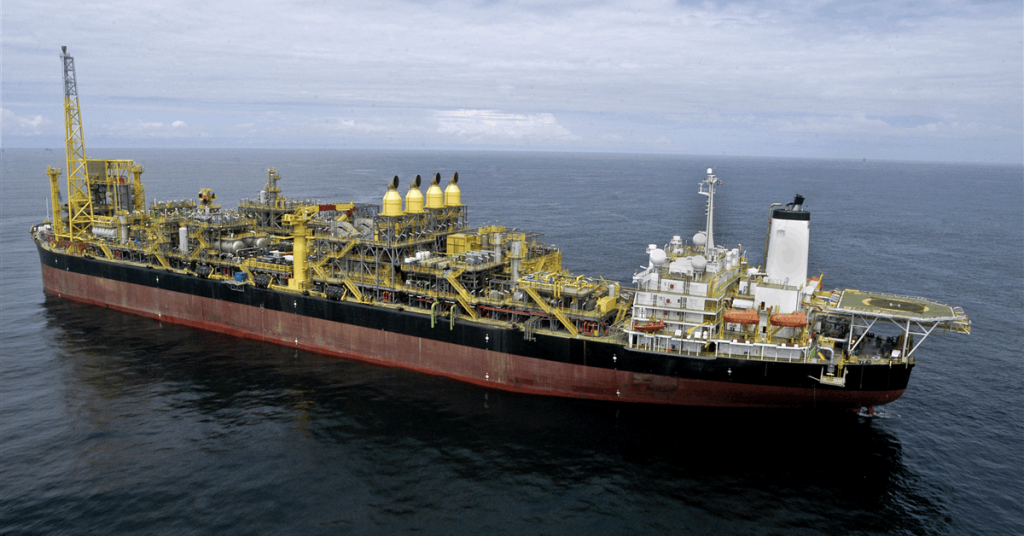Eni SpA said production has begun at the Agogo Integrated West Hub (IWH) development project, operated by Azule Energy in block 15/06 in the lower Congo Basin, offshore Angola.
Agogo IWH involves the full field development phase of two fields, Agogo and Ndungu, with combined reserves of approximately 450 million barrels and expected peak production of approximately 180,000 barrels of oil per day (bopd), Eni said in a news release.
The project is operated by Azule Energy, a BP plc and Eni company, with a 36.84 percent stake, alongside partners Sonangol E&P with 36.84 percent and Sinopec International with 26.32 percent.
The Agogo floating production, storage and offloading unit (FPSO) began operations 29 months after the project’s final investment decision, “significantly ahead of plan and around 12 months faster than industry average for deepwater projects of similar scale,” Eni said.
According to the company, the Agogo FPSO integrates “a variety of best-in-class and innovative technologies” aimed at minimizing greenhouse gas emissions, including full electric topside and marine systems and the first offshore combined cycle power generation system of this size. A pioneering pilot carbon capture and storage (CCS) unit is also installed onboard the FPSO.
Agogo is the first FPSO in Angola where operational carbon emissions are fully offset, Eni said.
The project model leverages a phased approach where fields are initially put into production through the exploitation of early phases, which allows to de-risk full field development, Eni stated. Agogo phase 1 was started in 2020 with a record time-to-market for deepwater developments, only nine months after discovery, the company said.
The model leverages in-house engineering capabilities and computational power, “which allow parallelization of subsurface studies, engineering and procurement during front end loading, and foster a strong grip on the execution phase,” Eni added.
Eni said it had started the development of Agogo and Ndungu before the establishment of Azule Energy with BP.
Collaboration with Acea
Meanwhile, Eni’s chemical company Versalis and Acea Ambiente entered into a memorandum of understanding (MoU) to collaborate on advancing the circular economy through joint recycling initiatives that recover value from post-consumer and post-industrial plastics.
The two companies will work together to analyze and select waste flows from Acea Ambiente’s facilities, aiming to assess their suitability for Versalis’ recycling processes, Eni said in a separate statement.
Their shared objective is to develop an integrated industrial supply chain capable of producing high-quality recycled plastics, while considering potential investments in new plants and the optimization of existing processes, according to the statement.
Versalis CEO Adriano Alfani said, “This agreement reinforces our commitment to building a circular economy for plastics by combining our industrial and technological expertise with that of a strategic partner like Acea Ambiente”.
According to Alfani, an industrial-scale version of the Hoop chemical recycling demonstration plant for mixed plastic waste, capable of processing 40,000 metric tons per year, will be built in Priolo, Italy, as part of the MoU.
Acea Ambiente CEO Gabriele Di Cintio said, “Acea Ambiente has [a] long-standing commitment to developing innovative and sustainable solutions. This agreement is a strategic step towards an integrated industrial model that recovers value from plastic waste, making a tangible contribution to the country’s circular economy while strengthening our role in the ecological transition and the progressive decarbonization of industrial processes”.
To contact the author, email rocky.teodoro@rigzone.com
Generated by readers, the comments included herein do not reflect the views and opinions of Rigzone. All comments are subject to editorial review. Off-topic, inappropriate or insulting comments will be removed.
element
var scriptTag = document.createElement(‘script’);
scriptTag.src = url;
scriptTag.async = true;
scriptTag.onload = implementationCode;
scriptTag.onreadystatechange = implementationCode;
location.appendChild(scriptTag);
};
var div = document.getElementById(‘rigzonelogo’);
div.innerHTML += ” +
‘‘ +
”;
var initJobSearch = function () {
//console.log(“call back”);
}
var addMetaPixel = function () {
if (-1 > -1 || -1 > -1) {
/*Meta Pixel Code*/
!function(f,b,e,v,n,t,s)
{if(f.fbq)return;n=f.fbq=function(){n.callMethod?
n.callMethod.apply(n,arguments):n.queue.push(arguments)};
if(!f._fbq)f._fbq=n;n.push=n;n.loaded=!0;n.version=’2.0′;
n.queue=[];t=b.createElement(e);t.async=!0;
t.src=v;s=b.getElementsByTagName(e)[0];
s.parentNode.insertBefore(t,s)}(window, document,’script’,
‘https://connect.facebook.net/en_US/fbevents.js’);
fbq(‘init’, ‘1517407191885185’);
fbq(‘track’, ‘PageView’);
/*End Meta Pixel Code*/
} else if (0 > -1 && 81 > -1)
{
/*Meta Pixel Code*/
!function(f,b,e,v,n,t,s)
{if(f.fbq)return;n=f.fbq=function(){n.callMethod?
n.callMethod.apply(n,arguments):n.queue.push(arguments)};
if(!f._fbq)f._fbq=n;n.push=n;n.loaded=!0;n.version=’2.0′;
n.queue=[];t=b.createElement(e);t.async=!0;
t.src=v;s=b.getElementsByTagName(e)[0];
s.parentNode.insertBefore(t,s)}(window, document,’script’,
‘https://connect.facebook.net/en_US/fbevents.js’);
fbq(‘init’, ‘1517407191885185’);
fbq(‘track’, ‘PageView’);
/*End Meta Pixel Code*/
}
}
// function gtmFunctionForLayout()
// {
//loadJS(“https://www.googletagmanager.com/gtag/js?id=G-K6ZDLWV6VX”, initJobSearch, document.body);
//}
// window.onload = (e => {
// setTimeout(
// function () {
// document.addEventListener(“DOMContentLoaded”, function () {
// // Select all anchor elements with class ‘ui-tabs-anchor’
// const anchors = document.querySelectorAll(‘a .ui-tabs-anchor’);
// // Loop through each anchor and remove the role attribute if it is set to “presentation”
// anchors.forEach(anchor => {
// if (anchor.getAttribute(‘role’) === ‘presentation’) {
// anchor.removeAttribute(‘role’);
// }
// });
// });
// }
// , 200);
//});

